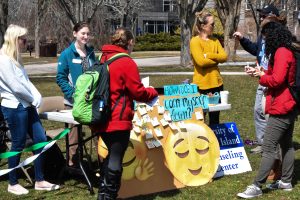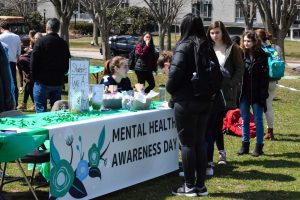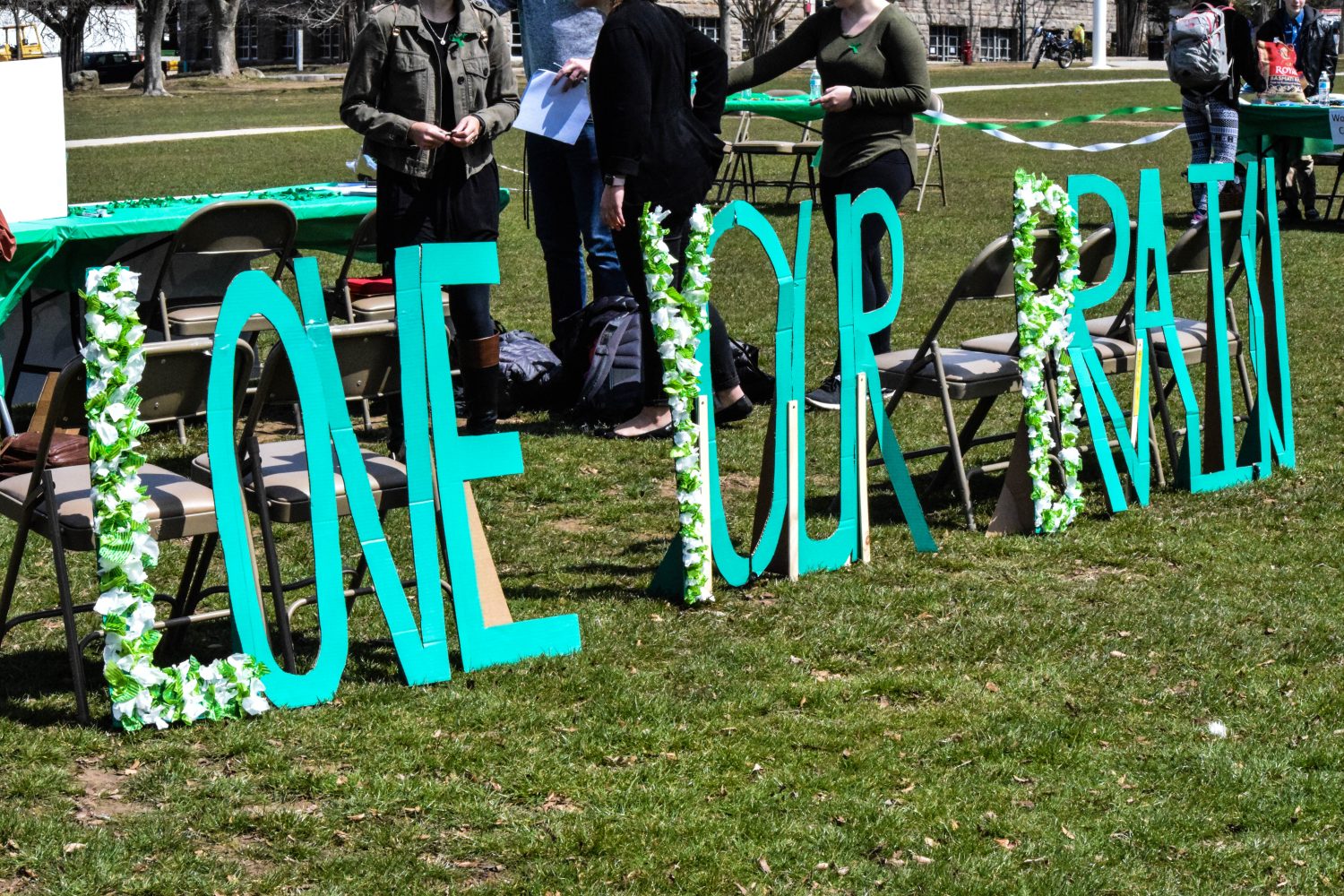Photo by Anna Meassick |CIGAR| Students enjoyed booths and food trucks all in efforts to spread awareness and knowledge about mental health on the Quadrangle.
On Wednesday, April 11 the University of Rhode Island hosted their first Mental Health Awareness Day on the quad. The unprecedented event was the Senior Honors Project of marketing student and event coordinator, Megan Kurose.
Kurose explained the idea for the event came from her own mental health journey as well as talking with friends and students on campus.
“It seems that it’s not that we don’t have enough services, it’s that people aren’t necessarily aware of the services we offer,” Kurose said.
In researching for the project, Kurose came to the conclusion that many students were only associating mental health help with Health Services or the Counseling Center, and not the 10 other resource centers at URI.
In order to get students more familiarized with the many different services offered, Kurose brought the services to the students. Each department held booths and students were free to roam around seeking out the different types of help.
Planning the project since January, Kurose believed a physical event would be the most impactful and reached out to all of the organizations. With resources at their fingertips, students were able to interact with student services they may not have even known existed on campus.
Kurose understands that while mental illness is stigmatized, it should be an open conversation. “They [students] shouldn’t feel needy or weird for asking for help,” explained Kurose. “Everyone who needs help should get help.”
The event encourages students that if they know someone that needs help, or if they themselves need help, to actively seek out services available. Kurose hopes this will bridge the gap between students and student resources. “This is a very loving campus, students should not be afraid of seeking out help,” she said.
With over 100 people in attendance at the kickoff of the event, students trickled in and out during the transitioning of classes. While some students just cut through and took a few pamphlets, many participated in interactive activities set up by the organizations in attendance.
The Dean of Students Office used their booth to advertise Rhody Outpost, the University’s food pantry, as well as testing student’s knowledge when it comes to safe alcohol consumption. Tasked with pouring “one” drink, students learned the alcohol they are consuming in what they believe to be one beverage is actually a lot more than the standard recommended amount.
For coping with stress, the Women’s Center offered a booth dedicated to making stress balls using balloons and rice, saying “fill it as big as your stress.” The balloons were teal in acknowledgement of April being Sexual Assault Awareness Month.
The Gender and Sexuality Center put a new spin on the “Take What You Need” post-it-board and included the information for local and national mental health hotlines for students to take for themselves and others.
At the Health Service’s booth, students contributed ideas to a poster labeled, “What do you do when you’re blue?” Adding activities, hobbies and interests that helped them to feel better, students were also able to read what those before them had contributed.
Similarly, the Counseling Center encouraged students to add post-it-notes to two categories, “what calms me down” and “what cheers me up.” With ample participation between classes where students curiously crossed the quad, students were able to share how they manage their emotions and look at the ideas other people had.
“The idea was to get people to think about the things they use to cope when they’re not feeling too good,” explained Warren Schwartz, who has a doctorate in psychology and is a psychologist at the Counseling Center.
Schwartz explained events like this help to spread awareness that mental health challenges are an important issue for students. Students face all sorts of stressors and the Counseling Center wants students to know that they are here to help students address those challenges.
“Many stressors present emotional challenges and the way those challenges manifest varies between individuals,” explained Schwartz.
Crediting the recently implemented Mental Health First Aid training, Schwartz explains an influx of their referrals come from people having daily encounters with the students who are having difficulties. With more informed people on the front lines, as well as outreach programs associating with different departments on campus, more people are being seen before it becomes a bigger problem.
Schwartz explained the model the Counseling Center strives for is a mutual communication between students and the Center.
“We do our best to address the stigma, which sometimes gets in the way of students seeking help, by making them aware of how normal it is to struggle in this environment,” said Schwartz.
Empathetic with what struggling in this environment can be like, junior Caroline Oatley believes that people do not always comprehend the difficulties other people are faced with.
“There are a lot of different people, with different backgrounds and different upbringings, and a lot of people fail to understand how different someone’s life may be or what they may be going through,” she said.
Breaking down stigma and starting a conversation around mental illness is why Oatley believes events like Mental Health Awareness Day are vital to the URI community. Oatley feels that a lot of universities are not equipped to prevent and treat mental illness, and that a lot of people see it as an issue affecting individuals when it should be treated and talked about by the community as a whole.
Oatley compares depression to getting out of a dark place, saying, “you can complain all you want about how your life sucks or you’re depressed, but it gets to a point where you’re done complaining and you need to do something about it, and that can be really difficult when you’re depressed.”
That difficulty can be aided by the resources offered, but only if students are aware of them. Having not known about the different services available on campus, Oatley is now an advocate for informing other students with shared experiences, and educating students who are unfamiliar with mental illness.
“Understand that you don’t understand,” Oatley said. “You can try to understand, and that’s where respect comes in and you’re able to provide a safe space, but you can never fully relate to someone’s personal experiences”
Oatley also believes the way the campus talks about mental illness is important to reducing stigma, and explains that someone can be in a depressed mood without having depression just as someone can be anxious without having anxiety.
Other booths at the Mental Health Awareness Day that further communicated the points addressed by Oatley were Disability Services, the Psychological Consultation Center, URI Police Department, URI Emergency Medical Services, Substance Abuse Prevention Services, Housing and Residential Life and URI Eating Concerns Advisors.
Kurose hopes that what students take from her project is that mental health is just as important as physical health and that anyone struggling should feel encouraged to reach out to the many services available at URI.



